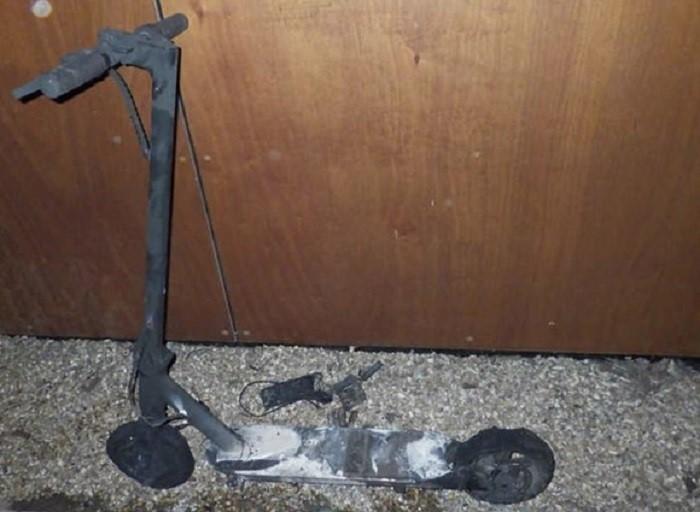Electric Vehicles
Despite the undoubtable benefits of electrifying our transport fleet – from reduced air pollution to enabling us to achieve the essential net-zero targets – among the EV community there is a growing sense of concern about the dangers and apparent spontaneity of EV fires. When it comes to electric scooters, we have also seen a huge rise in the popularity of e-scooter use by members of the public.

Causes of an electric vehicle fire
Electric vehicles are powered most commonly by a rechargeable lithium-ion battery. The first lithium-ion battery was invented in the 1990s and it was used to power a car in the early 2000s.
In comparison, petrol and diesel vehicles have been around for well over 100 years, so comparatively we are yet to obtain the same data and understanding when it comes to product safety.
Fundamentally, electric vehicles are extremely safe, but the main danger occurs when the lithium-ion battery is damaged, which might happen if it is exposed to extreme heat or something penetrates the battery cell wall.
How often do they occur?
Although these fires do present a real danger, fortunately for us they remain very rare.
Data obtained by Air Quality News through a Freedom of Information (FOI) request revealed that in 2019 the London Fire Brigade dealt with just 54 electric vehicle fires compared to 1,898 petrol and diesel fires.
Although these fires remain rare, when they do occur, they can be extremely dangerous.
During an electric vehicle fire, over 100 organic chemicals are generated, including some incredibly toxic gases such as carbon monoxide and hydrogen cyanide – both of which are fatal to humans.
E-scooters and Electric Bikes
Lithium-Ion (Li-Ion) Batteries which are used in electric scooters (e-scooters), hover boards etc. are an emerging risk and care should be taken when using and charging the products.
The fire risk that lithium-ion batteries pose to a home is only really a concern if the battery has a flawed design, low-quality components or poor charging hardware. Lithium-ion batteries have been known to overheat leading to catastrophic failure. Fires involving lithium-ion batteries have been known to re-ignite after it has been extinguished, because of this if a lithium-ion battery fire starts its really important to "Get Out, Stay Out and Call 999" asking for the fire service.
A report by Electrical Safety First states “There is growing concern over the rise in fatalities, injuries and devastating fires from electric bikes (e-bikes) and e-scooters. Tragically, in the first three months of 2023 alone, fires from lithium-ion batteries used to power these devices had already taken four lives in the UK, left others hospitalised or seriously injured and caused extensive damage to property.”
Incidents often occur when an e-scooter or e-bike that has been purchased from a dealer that has not applied the same vigorous testing as a more reputable one. These batteries may be more prone to over heating particularly if left charging after they are fully charged.

- Ensure you have working smoke alarms. If you charge or store your e-bike or e-scooter in a garage or kitchen ensure you install detection, we recommend heat alarms rather smoke detectors for these areas.
- If possible charge in an outbuilding such as garage, with suitable smoke detection installed.
- As much as possible keep the item away from other flammable items, whilst both on and off charge.
- Don’t charge in common areas of buildings e.g flats/HMOs (House in Multiple Occupation).
- Batteries don’t like shock; dropping them may cause invisible damage.
- Don’t charge overnight or when unattended.
- If any swelling of the battery is noticed, do not use the battery/device.
- Do not charge near soft furnishings.
- When devices are charging ensure, they are not blocking the escape route or in communal areas of a multi occupied building. If there’s a fire, it can affect people’s ability to escape.
- Inform trading standards of any goods believed to be counterfeit.
- Be mindful that it is possible for batteries to ignite when the device is not on charge or has recently been charging.
- Check electrical safety-first website for product recalls https://www.electricalsafetyfirst.org.uk/.
- Register your product with the manufacturer to validate any warranties – batteries are usually included in warranties. Registering makes it easier for manufacturers to contact you in the event of safety or recall information.
- Buy e-bikes, e-scooters and spare parts including chargers and batteries from reputable retailers.
- Follow the manufacturer’s instructions when charging and always unplug your charger when it’s finished charging.
- Lithium-Ion batteries should not be disposed of with your usual rubbish, contact your local recycling centre for advice.


